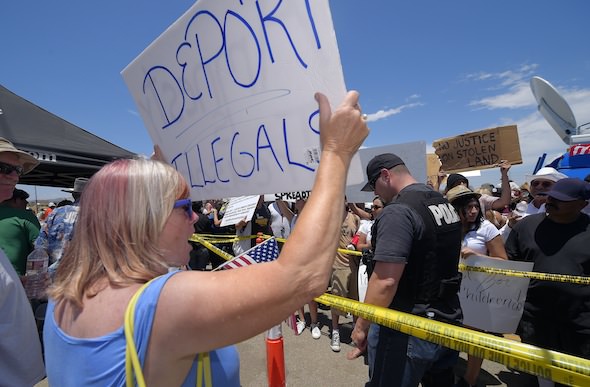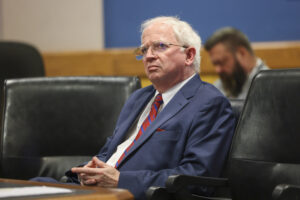Hate in Murrieta and Violence in El Salvador
As American protesters in Murrieta, Calif., repulsed three busloads of immigrant mothers and children being considered for placement in the U.S., a journalist recalled the grisly Washington-funded civil war in El Salvador that killed more than 75,000 people as a cause of the refugees' displacement.
As American protesters in Murrieta, Calif., repulsed three busloads of immigrant mothers and children being considered for placement in the U.S., a journalist recalled the grisly Washington-funded civil war in El Salvador that killed more than 75,000 people as a cause of the refugees’ displacement.
“Walking through the arrival area of the airport,” Susanne Ramirez de Arellano writes of her arrival in El Salvador 26 years ago, “the first thing I saw were posters everywhere of children in crutches, children that had lost limbs to landmines supplied by the United States to the Salvadoran government. Welcome to El Salvador. I was a naive young journalist stepping into hell.”
The reporter attended an exhumation of corpses with a small group of international journalists.
“A representative from the Salvadoran human rights group Tutela Legal, founded by the Archdiocese of El Salvador, had arrived at my apartment at 8 a.m. and knocked loudly on the door,” de Arellano continues. “Bleary-eyed and hung over after a night of dominos, tequila and various chemicals, I opened it and stood there as she told me that all the foreign press was invited to an exhumation. Most of the foreign media had been at my house all night — we were not many — and we were really in no condition to witness anything.
“We piled into taxis and began the long journey to the town, which was on the outskirts of the capital. The story was this—10 people had been executed in an attack. The FMLN claimed that the military had done it‚ that they had rounded them all up, tied them together, and opened fire and lobbed hand grenades at them— until they all died. The military claimed that the rebels had done it—in much the same way. The dead had been interred for more than one week. Tutela Legal had secured permission to exhume the bodies to try and ascertain what had really happened.”
The group of reporters witnessed a drunken local duo attempt to pry the corpses from the ground. “Forensic experts” then butchered the bodies to try to determine the causes of death. One veteran journalist vomited as the process went on in the hot sun for hours.
“The townspeople that were there refused to say what had happened. If they blamed the military, the soldiers would extract revenge. If they blamed the rebels, they could expect the same kind of treatment. They were trapped between the two—the real victims of the conflict.”
The legacy of that conflict “is sitting on buses in Murrieta,” de Arellano writes. “The violent street gangs that now plague Central America, especially El Salvador, were conceived during this dark period. Modern day death squads that now visit terror on their own people, trained in the streets of Los Angeles.”
“We who witnessed this terrible war need to go back and tell the world what happened. Let the bones finally have their say.” The U.S.-endorsed violence still exploding in Central American countries is the reason “why we need to let those on those buses in.”
— Posted by Alexander Reed Kelly.
Your support matters…Independent journalism is under threat and overshadowed by heavily funded mainstream media.
You can help level the playing field. Become a member.
Your tax-deductible contribution keeps us digging beneath the headlines to give you thought-provoking, investigative reporting and analysis that unearths what's really happening- without compromise.
Give today to support our courageous, independent journalists.






You need to be a supporter to comment.
There are currently no responses to this article.
Be the first to respond.